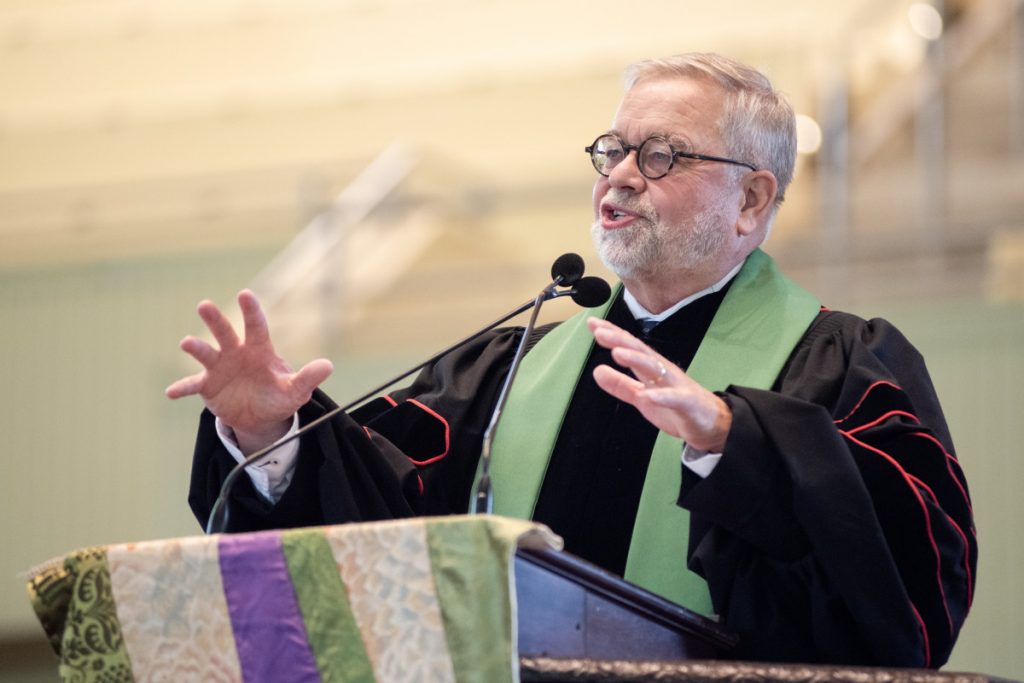
Column by Mary Lee Talbot
“This year is a great year for baseball. The Blue Jays, who are supposed to be the worst team, are in first place in the dog days of August, and the whole city is excited. Our church even played ‘(Take Me Out to the Ballgame),’ ” said the Rev. J. Peter Holmes.
He continued, “I saw a picture on Facebook of a baseball player who had hit a walk-off, grand slam home run. The dugout had emptied, and there was joy on their faces. They had been losing 3–0 and now won the game 4–3. Underneath the picture, someone had written, ‘I know of a man that collects pictures of hitters on their way around third, running towards home after hitting a walk-off home run. Because with everyone crowding in to celebrate, it is how he views us entering heaven.’ ”
Holmes preached at the 9:15 a.m. Tuesday morning worship service in the Amphitheater. His sermon title was “Rounding Third,” and the scripture reading was Luke 15:11–32.
Luke’s gospel chapter 15 contains three parables about being lost: the lost coin, the lost sheep and the prodigal son. Jesus, said Holmes, told his listeners that there would be more rejoicing in heaven over one lost sinner who was found than all the others who got into heaven.
The word prodigal is not in the text “but it means reckless, wastefully extravagant,” Holmes told the congregation. “And the No. 2 son was reckless and spent all his money on dissolute living. His older brother had been keeping notes on all the things his brother should not have been doing. The younger son ends up on a pig farm and longs to eat what the pigs are eating.”
Jesus is speaking to pious religious leaders, and they needed to know that when the prodigal came home there would be a celebration. In this parable, Jesus is appealing to the older brother, even though his brother had dishonored the family.
Holmes shared a story of a Lutheran pastor in Montreal who on Easter Sunday saw a young woman in the last row who had broken her parents’ hearts. “He decided ‘she will not get communion from me if she comes up to the communion rail,’ ” Holmes said. “Jesus is calling us to have open hearts because Jesus was called to open doors.”
The father in the story of the prodigal son ran to him, possibly to protect him since everyone was so angry about what he had done with his inheritance, Holmes suggested. “Jesus was saying, ‘The father ran because he loved his son.’ ”
He continued, “God loves everyone. We need to be open to whoever has fallen. I know fathers and mothers who have stayed awake late at night and gone out into the night in search of a child. But, sometimes the biggest concern is when they come home, and they believe that the people in the church will not welcome them because they know how they have hurt us.”
Holmes returned to the picture on Facebook and said that there were lots of likes and shares and words of thanks and comfort. But one person wrote, “I am finished. I never hit home runs. All I have ever done in life is strike out. If I have to hit a home run to get into heaven, it is hopeless.”
Holmes said, “What do we say to people who think that it is hopeless because they just can’t get there? Jesus comes to eat with you and to welcome you. He loves you. No matter how many times that son struck out, that father was always looking for him. His heart was always open.”
Writer and musician John Jeremiah Sullivan wrote an essay about his experience of going to a youth group with friends, being baptized and then wandering away from faith. In the essay, he said that when he gets together with friends, many of them had the same experience, and they laugh about it and call the experience juvenile. “Why does the topic keep coming up?” Sullivan wrote. “Because deep down, I still love Jesus, and I am beginning to doubt my doubts.”
Holmes said, “Deep down, the prodigal knew that his father had never turned his back on him. The prodigal knew where home was. As we sang in our first hymn, ‘Come home, come home, you who are weary come home.’ The father never stopped praying, hoping and loving, because God does not stop praying, hoping, loving.”
One of the people who responded to the person who wrote on Facebook “I am finished” set some context for the home run. It was August 2018, and the Chicago Cubs were hosting the Washington Nationals. The Nationals pitcher had a perfect game up through the eighth inning. (He now pitches for the Blue Jays). A relief pitcher came in for the ninth inning because the Nationals were leading 3–0.
The relief pitcher loaded the bases as each batter came up in the bottom of the ninth and got a base hit. The Cubs coach called in a pinch hitter who had been up and down from the farm club all season. On a 2–2 count, he hit a home run. The Cubs won 4–3.
“I cannot help but think, you know, we all strike out in this life,” Holmes said. “God has a pinch hitter who goes to the cross but is raised up and opens doors, and there is Easter and joy.”
The Lutheran pastor in Montreal on that Easter Sunday saw the young woman was the last one at the communion rail. His heart was warmed, and he served her communion. Later, he noticed the tear stains on the rail.
“He thought, ‘Who am I? Who am I to close the doors on someone who comes as this daughter came?’ She was home and safe and Christ had made the way. And I like to think that while many of those tears were her tears, some of those tears were from the great cloud of witnesses,” Holmes said. “There is rejoicing whenever a lost one comes home. ‘Come home, come home, you who are weary, come home.’ May our hearts be open to those who are rounding third and coming home.”
The Rev. Mary Lee Talbot, a Presbyterian minister, presided. Elizabeth Schoen, one of the 2025 Abrahamic Program for Young Adults coordinators, read the scripture. The prelude, performed by organ scholar Owen Reyda on the Massey Memorial Organ, was “Andante Pathétique” by John Stainer. The Motet Choir sang “Going Home,” music by Antonín Dvořák and text and adaptation by William Arms Fisher. The choir was under the direction of Joshua Stafford, director of sacred music and the Jared Jacobsen Chair for the Organist, and accompanied by Laura Smith, organ scholar, on the Massey organ. The postlude was an impromptu on “Going Home” and “Take Me Out to the Ball Game” by Stafford, played on the Massey organ. Support for this week’s chaplaincy and preaching is provided by the Alison and Craig Marthinsen Endowment for the Department of Religion.




